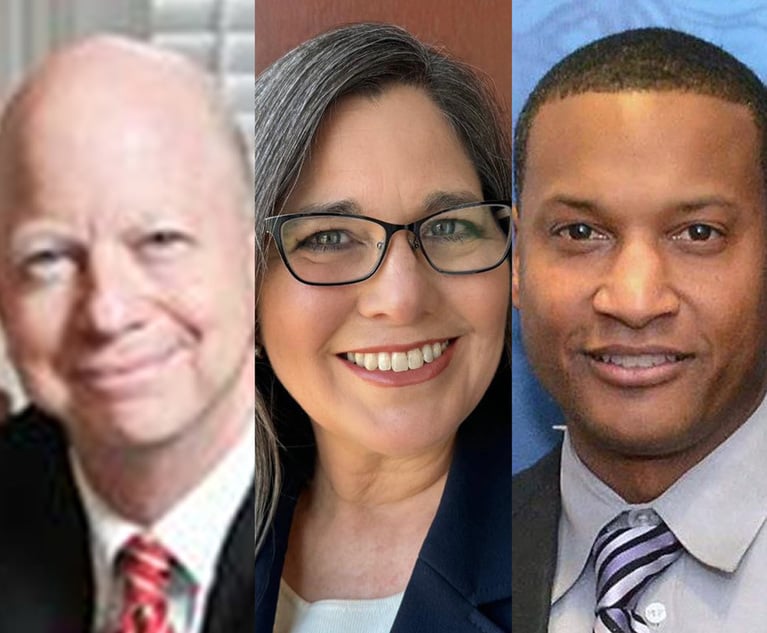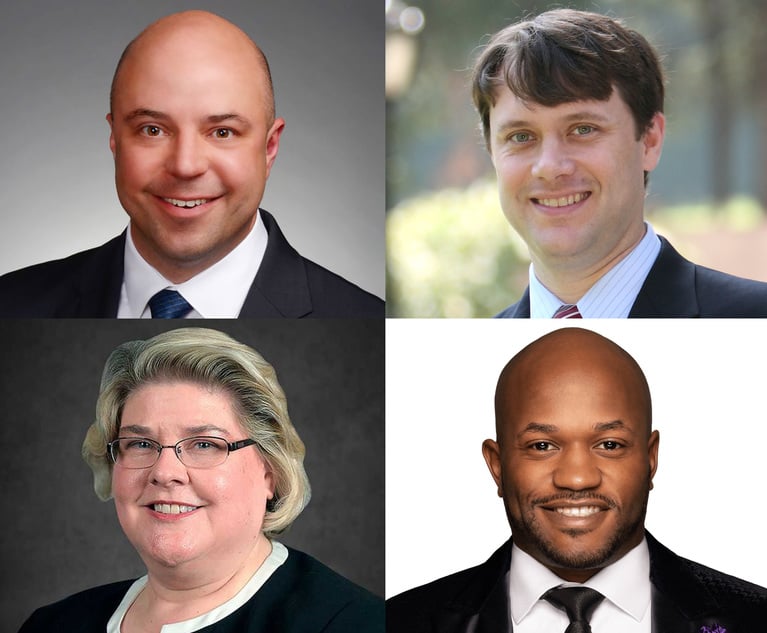 Carlos A. González of The Gonzalez Firm, Atlanta. (Courtesy photo)
Carlos A. González of The Gonzalez Firm, Atlanta. (Courtesy photo)Special Masters Can Help Overloaded Courts Amid COVID-19
Courts and lawyers must adopt creative approaches to ensure civil dockets do not get neglected and parties secure timely access to justice. Therefore, it is especially worth noting that special masters are well situated to assist courts and litigants as they confront these challenges.
April 24, 2020 at 11:16 AM
5 minute read
The ongoing COVID-19 pandemic has resulted in a veritable shutdown of the entire country. Federal and state courts are not exempt. In response, they have significantly curtailed their activities. Jury trials have been suspended, criminal proceedings delayed and rulings on discovery and pretrial motions in many civil cases postponed. All of this adds up to court systems under great stress.
When the courts emerge from this current crisis, judicial resources will be at a premium. Having priority on the docket, criminal matters will take up much of a court's time, leaving civil cases to accumulate and causing delays to multiply. Courts and lawyers must adopt creative approaches to ensure civil dockets do not get neglected and parties secure timely access to justice. Therefore, it is especially worth noting that special masters are well situated to assist courts and litigants as they confront these challenges.
Special masters serve a variety of roles as judicial adjuncts, and they do so without burdening court resources. Appointed in routine and multiparty and multidistrict litigation alike, masters can assist with case management, handle pretrial issues and resolve problems before they become full-blown disputes. Judges regularly empower special masters to issue reports and recommendations on pending motions, to prepare evidence for submission to the court and to facilitate settlements. Courts also appoint masters in criminal cases to consider Brady obligations and privilege issues that sometimes arise in the context of search warrants. Masters also are called upon to monitor the enforcement of court orders. Importantly, the appointment of a master can save parties substantial attorneys' fees by leading to quicker, and often informal, resolution of disputes as they arise.
Cost concerns and the perception of an intermediary between the judge and the parties sometimes contribute to the unease litigants and lawyers may have about the appointment of a special master. Careful planning and clear objectives in selecting a master, as well as the experience of the special master him or herself, usually allays the early disquiet. Once all involved understand that the master's responsibility is to aid in case management in such a way as to save costs and increase the efficiency with which litigation disputes are identified and resolved, concerns about the appointment often ease.
In January 2019, the American Bar Association adopted "Guidelines for the Appointment and Use of Special Masters in Federal and State Civil Litigation." The guidelines promote the effective administration of justice by encouraging courts to use special masters in appropriate situations. Laid out in nine specific recommendations, the guidelines articulate the circumstances when courts should consider using masters, the factors that should go into selecting an appropriate judicial adjunct and how states and courts can develop educational programs to increase the number and diversity of potential masters. Ultimately, under Rule 53 of the Federal Rules of Civil Procedure and most corresponding state rules, the decision to appoint a special master rests exclusively with the court, although parties are entitled to notice and an opportunity to be heard in most instances.
Court orders appointing a special master must include a clear statement of the master's responsibilities and duties; the circumstances, if any, in which the master may communicate ex parte with the court or parties; the materials to be maintained by the master; and the terms of the master's compensation. How these requirements are structured depends on the nature of the case in which the master is to be appointed. For example, in determining the master's compensation, the court can set an hourly rate, require that the master work for a flat fee or impose a hybrid of the two. The court is required under the Federal Rules of Civil Procedure to allocate the master's fee among the parties after consideration of the parties' means, the nature and amount of the controversy and the extent to which one party's conduct has led to the appointment of the master.
In conducting their duties, special masters in federal courts are held to the same code of conduct as judges. In fact, prior to any federal appointment, special masters are required to certify by affidavit that they are not aware of any grounds that would disqualify them under the same rules that apply to federal judicial officers generally. Courts are free to impose additional ethical requirements tailored to the needs of a specific case. It is worth noting that as part of its ongoing review of the role of special masters, the ABA is now studying whether it should promulgate dedicated rules of professional conduct for masters.
As judicial adjuncts acting at the direction of the court, special masters are well positioned to move quickly and help courts, lawyers and parties work through the coming wave of litigation. The breadth of duties that can be assigned to a special master are significant, and masters can lessen the burden on already overtaxed judges and court staffs.
Carlos A. González is principal of The González Firm in Atlanta and president of the Academy of Court Appointed Masters. His firm focuses on providing ADR services.
|This content has been archived. It is available through our partners, LexisNexis® and Bloomberg Law.
To view this content, please continue to their sites.
Not a Lexis Subscriber?
Subscribe Now
Not a Bloomberg Law Subscriber?
Subscribe Now
NOT FOR REPRINT
© 2024 ALM Global, LLC, All Rights Reserved. Request academic re-use from www.copyright.com. All other uses, submit a request to [email protected]. For more information visit Asset & Logo Licensing.
You Might Like
View All


Who Got the Work: 16 Lawyers Appointed to BioLab Class Action Litigation
4 minute read
Trending Stories
Who Got The Work
Michael G. Bongiorno, Andrew Scott Dulberg and Elizabeth E. Driscoll from Wilmer Cutler Pickering Hale and Dorr have stepped in to represent Symbotic Inc., an A.I.-enabled technology platform that focuses on increasing supply chain efficiency, and other defendants in a pending shareholder derivative lawsuit. The case, filed Oct. 2 in Massachusetts District Court by the Brown Law Firm on behalf of Stephen Austen, accuses certain officers and directors of misleading investors in regard to Symbotic's potential for margin growth by failing to disclose that the company was not equipped to timely deploy its systems or manage expenses through project delays. The case, assigned to U.S. District Judge Nathaniel M. Gorton, is 1:24-cv-12522, Austen v. Cohen et al.
Who Got The Work
Edmund Polubinski and Marie Killmond of Davis Polk & Wardwell have entered appearances for data platform software development company MongoDB and other defendants in a pending shareholder derivative lawsuit. The action, filed Oct. 7 in New York Southern District Court by the Brown Law Firm, accuses the company's directors and/or officers of falsely expressing confidence in the company’s restructuring of its sales incentive plan and downplaying the severity of decreases in its upfront commitments. The case is 1:24-cv-07594, Roy v. Ittycheria et al.
Who Got The Work
Amy O. Bruchs and Kurt F. Ellison of Michael Best & Friedrich have entered appearances for Epic Systems Corp. in a pending employment discrimination lawsuit. The suit was filed Sept. 7 in Wisconsin Western District Court by Levine Eisberner LLC and Siri & Glimstad on behalf of a project manager who claims that he was wrongfully terminated after applying for a religious exemption to the defendant's COVID-19 vaccine mandate. The case, assigned to U.S. Magistrate Judge Anita Marie Boor, is 3:24-cv-00630, Secker, Nathan v. Epic Systems Corporation.
Who Got The Work
David X. Sullivan, Thomas J. Finn and Gregory A. Hall from McCarter & English have entered appearances for Sunrun Installation Services in a pending civil rights lawsuit. The complaint was filed Sept. 4 in Connecticut District Court by attorney Robert M. Berke on behalf of former employee George Edward Steins, who was arrested and charged with employing an unregistered home improvement salesperson. The complaint alleges that had Sunrun informed the Connecticut Department of Consumer Protection that the plaintiff's employment had ended in 2017 and that he no longer held Sunrun's home improvement contractor license, he would not have been hit with charges, which were dismissed in May 2024. The case, assigned to U.S. District Judge Jeffrey A. Meyer, is 3:24-cv-01423, Steins v. Sunrun, Inc. et al.
Who Got The Work
Greenberg Traurig shareholder Joshua L. Raskin has entered an appearance for boohoo.com UK Ltd. in a pending patent infringement lawsuit. The suit, filed Sept. 3 in Texas Eastern District Court by Rozier Hardt McDonough on behalf of Alto Dynamics, asserts five patents related to an online shopping platform. The case, assigned to U.S. District Judge Rodney Gilstrap, is 2:24-cv-00719, Alto Dynamics, LLC v. boohoo.com UK Limited.
Featured Firms
Law Offices of Gary Martin Hays & Associates, P.C.
(470) 294-1674
Law Offices of Mark E. Salomone
(857) 444-6468
Smith & Hassler
(713) 739-1250






